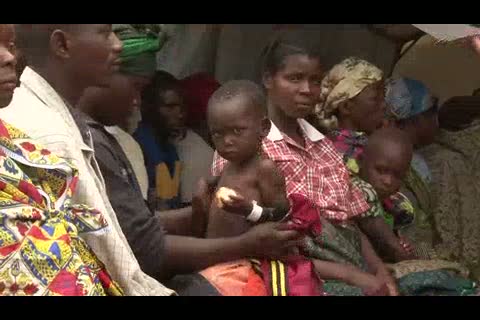- Text size
 |
|  |
|  |
| 
- Français
UNHCR fears for Congolese civilians caught in violence
News Stories, 9 May 2007

KIWANJA, Democratic Republic of the Congo, May 9 (UNHCR) – Crouching in a mud hut after a tropical downpour, the UNHCR monitoring team listened as 10 widows told of the dangerous dilemma that they and tens of thousands of other displaced people face in Democratic Republic of the Congo's (DRC) North Kivu province.
"The population is caught in a trap. The FDLR [rebel Democratic Forces for the Liberation of Rwanda] accuse us of collaboration with the military, and the military accuse us of collaboration with the FDLR," said one of the women, who had all sought safety at the Kiwanja site for displaced people after fleeing their villages.
Although large-scale fighting between rival armed forces has died down in the region, civilians still face threats, attacks and even death and rape in North Kivu. The continuing instability has prompted some 123,000 Congolese to flee their homes across the province over the past three months. Some live in flimsy shelters at displacement sites, others stay with host families.
UNHCR is highly concerned about this displacement of civilians and the targeting of innocents. "Burning of civilian homes and killings of civilians must stop immediately," insisted Ralf Gruenert, UNHCR's deputy representative for protection in the DRC. "We urge all armed groups in North Kivu to refrain from practices violating international humanitarian and human rights law," he added.
The UN refugee agency and its humanitarian aid partners have stepped up visits to sites housing people who have fled their homes in this latest wave of internal displacement in the east of the country. It followed the deployment of new mixed brigades in North Kivu last February and military operations launched by DRC government troops against the FDLR last month. The mixed brigades include regular army troops and former dissident armed groups.
The full scale of the abuse in North Kivu is unclear because aid workers cannot enter certain zones due to security reasons. But displaced people questioned in Kiwanja made it clear that the problem was grave.
Bangamabo Jeton claimed that his eldest son, aged 29, had been killed in February when a government mixed brigade arrived in his village, Kiseguru. "I still ask myself why my eldest son was killed. He was no bandit, no soldier. I am asking myself, but I don't find the answer," said the grief-stricken man, who fled five kilometres with his wife and two surviving children to Makoka village.
"In Makoka, the situation got worse and worse. Bandits entered the houses at night, stealing. I didn't want to die like my son, that's why I fled here [in early May]," Jeton explained. UN peace-keeping troops are protecting the site where Jeton, his family and many others have sought refugee.
Teacher Patrice Luandu*, aged 36, said he lost everything when men armed with rifles and machetes, whom he claimed were FDLR, came to his village, Kasave. "The first time they came, they asked for money and took the clothes of my wife," he said, adding that they later returned for more. Luandu and his family decided to sleep in the bush at night and eventually made their way last week to Kiwanja.
UNHCR's sister agencies, the UN Childrens' Fund (UNICEF) and the World Food Programme (WFP), have been distributing aid to many of the newly displaced in Kivu. The UNHCR monitoring teams, meanwhile, listen to the concerns of a wide range of civilians, including children and women who are often reluctant to discuss their problems in the presence of men. The meeting here with the 10 widows was one such example.
Another aim of UNHCR monitoring is to find out from the displaced what their main needs are. The widows said access to safe drinking water was a problem, while teenagers said they feared being recruited into armed groups like some of their friends. Others cited emergency health care and shelter.
More than one million people remain displaced in DRC, including an estimated 600,000-plus in North Kivu. Some 340,000 Congolese are refugees, mostly in neighbouring countries in the Great Lakes region.
* Name changed for protection reasons
By Jens Hesemann in Kiwanja, Democratic Republic of the Congo










































